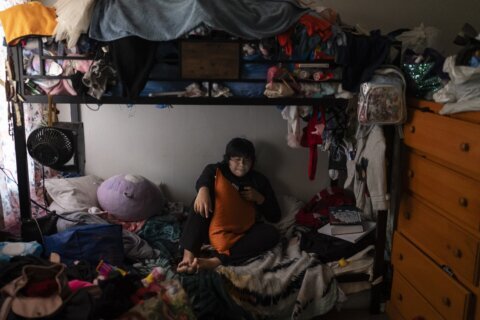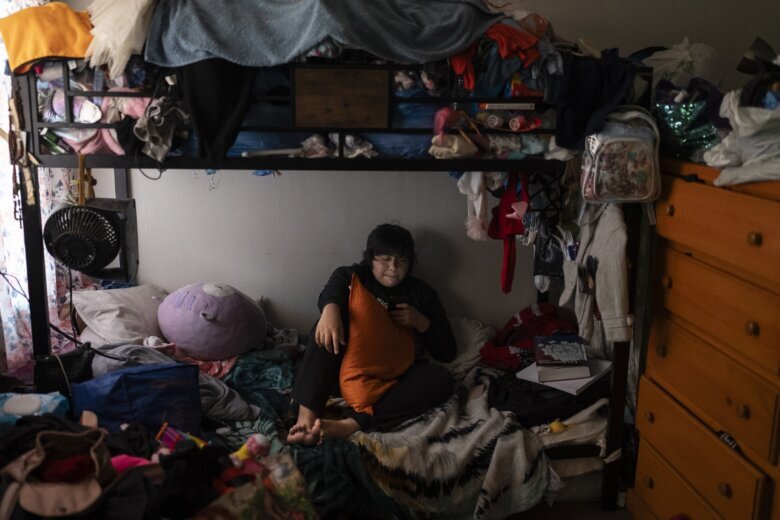
LOS ANGELES (AP) — This was the summer Deneffy Sánchez was supposed to learn algebra, biology and the other ninth grade classes he failed last year because he was too depressed and overwhelmed. But advancing to 10th grade had to take a back seat for now. He had more pressing concerns.
It was June. Deneffy, 15, lay in the twin bed he shares with his mother and little sister, while their new roommate — a stranger only weeks before — lamented having to live with his family.
“I would never have let them live here if I’d known how they behave,” Fabiola Del Castillo told a reporter in Spanish. Deneffy’s mother, Lilian López, stood next to her in the cramped room where they all ate and slept.
“Saturday is the first. You need to leave by then,” Del Castillo said, turning to López.
Saturday was only three days away. For Deneffy, that meant a ticking clock.
He had to save his apartment.
___
No one has stopped the clock for Deneffy or other older students who fell behind when the pandemic shuttered classrooms.
Time is running out on high school, yet millions of students aren’t showing up to class every day. When they do make it, untold numbers are so consumed with their troubles that they struggle to learn. Others have disappeared from school altogether.
Each community has its own set of circumstances that have conspired to sabotage young people’s dreams during and after COVID-19. In Los Angeles and much of California, housing insecurity has devastated children and teens’ chances at recovery like nothing else.
“Housing is the biggest reason kids aren’t going to school or we can’t find them,” says Elmer Roldan, executive director of Communities in Schools of Los Angeles, an organization that helps dozens of Los Angeles Unified schools follow up with students who are chronically absent.
Last year, two in five Los Angeles Unified School District students missed more than 10% of the school year, according to data supplied by the district.
There’s more. By April, the district had lost track of more than 2,500 students — kids who quietly stopped attending school and never appeared to enroll elsewhere, according to preliminary data posted on the district website.
The reasons are varied and, in many cases, entirely unknown. Deneffy’s odyssey is but one example of how the pandemic wrecked the life of a vulnerable teen, and why he’s struggled to return to studying.
___
Before the pandemic, Deneffy didn’t like school. But he rarely missed it.
He spent his afternoons playing soccer or baseball with friends at the park. On the weekends, he trained with the police department’s youth cadet program, advancing his mom’s dream that he become a police officer.
This summer, while more fortunate teens worked their first jobs, flirted at the beach or even attended summer school, Deneffy was inside. He was holding down a spot in an apartment, engaged in a battle of wills with a hostile adult roommate.
On the day a reporter visited his home, he lay in bed, a fuzzy blanket emblazoned with the face of Queen Elsa from “Frozen” pinned to the wall behind him. He pretended to be lost in his phone, but he was secretly recording Del Castillo just in case his family needed it someday.
Just feet away, his mother, a petite 47-year-old who emigrated from Guatemala 22 years ago, stood calm, her 3-year-old daughter at her knee.
“But I paid all of the rent for June since you didn’t have it. And you said that you would pay for July,” she said in Spanish. López had given Del Castillo money orders totaling $1,240, though López doubted the landlords charged that much for the dilapidated 450-square-foot apartment.
“Yes,” said Del Castillo, acknowledging López had paid for both June and July. “But how am I going to have you here two months? I can’t.”
Turning back to the reporter, Del Castillo continued: “They don’t let me sleep. They’re loud and they snore.” She started to cry.
Then she added a new threat. Having spent all the money López gave her, Del Castillo didn’t have July’s rent. So she would relinquish the apartment and keys at the end of the month.
They needed to get out.
___
The majority of students the government considers “homeless” do indeed have a place to sleep, but it’s precarious and often shared with roommates, according to federal statistics. In Los Angeles, more than 13,000 students are homeless and 2,000 of them stay in shelters, the city’s superintendent said last spring.
López says she was assaulted while the family stayed in a shelter after getting evicted three years ago. That’s why she’s determined to find her own housing.
The scarcity of affordable housing in Los Angeles has given anyone with an apartment lease in their name the power to take advantage of people like López who don’t have the saved cash, references or savvy to compete for their own place and are desperate to avoid shelters.
It was Deneffy’s idea for him to stay in the apartment for weeks on end and physically block Del Castillo from throwing them out. She had once locked out López and Jennifer, his little sister, while he was at school.
“It’s scary that she could do that again and we couldn’t do anything about it,” he said. “I don’t feel safe leaving.”
Without a father at home, Deneffy, in some ways, has filled the gap. He watches Jennifer when his mom has to work. He wants a job to help pay rent. He often thinks about López dying and making him responsible for his little sister.
Jennifer already has a name for her teenage brother. She calls him Papá.
___
Studies show students who take on parental roles have struggled to stay in school. Family responsibilities or financial obligations have caused 35% of student dropouts since the pandemic, according to a January report from Communities in Schools and MDRC, a think tank focused on poverty and education.
Deneffy began shouldering adult responsibilities at the same time he lost control over his home and school life. He became homeless in September 2020, just a week after his mom gave birth to Jennifer.
School was online that fall and for most of the year. Instead of engaging and supporting him at that difficult moment, school was alienating. When he logged into seventh grade Zoom classes from the chaotic shelter, “I felt like they were judging me,” he says of his classmates. “I couldn’t focus.”
Seventh grade was a total loss academically and socially. Not wanting to explain his living situation, he stopped talking to friends, classmates and teachers.
That all caught up to him in ninth grade as classes became harder. He never raised his hand. He didn’t have home internet, making it difficult to complete homework. When the school gave tests, he guessed at the answers.
His school offered homework help after his grades crashed. It was assistance he could use.
But what he really wanted was a therapist.
Deneffy says he asked his school’s “psychiatric social worker” sometime in the fall of ninth grade if she could get him professional mental health counseling. But the demand for such help has skyrocketed. A full 42% of high school students surveyed in 2021 by the Centers for Disease Control said they felt persistently sad or hopeless, compared with 28% a decade before.
Instead of getting him his own therapist, the social worker pulled him out of study hall when she could — about once a month — for “check-ins,” according to Deneffy. District and school representatives said they supported homeless students, but would not comment on Deneffy’s situation.
When he visited the social worker, he’d smile at the pictures of her dog, play with the fidget spinners on her desk and update her on his living situation. She’d ask him to rate his stress levels. It was usually a 10 — the highest level.
She’d praise him for recognizing his depression and finding his own coping mechanisms, drawing princesses and people wearing Victorian clothing and repeating positive affirmations to himself. He’d return to class feeling relaxed.
Until the next class started.
___
The stress started to mount that spring. One of the families they were sharing an apartment with had a daughter in drug rehabilitation. She would come home and suffer from withdrawal, or she would use drugs again. And Deneffy would witness a lot of it.
He spent school days listening to moody electronic music in his earbuds and staring at his phone. ”When is this gonna be over?” he would think to himself. “When will I get my happy ending — an apartment?”
Some days he didn’t show up to school at all, skipping as much as 30 days of school that spring. During year-end finals, two of the women assigned to help him with his homework pulled him out of class and brought him to their office, a former storage space outfitted with desks and a table.
Why hadn’t he done any homework all year? they asked. Why hadn’t he studied?
“I’m sorry,” he remembers telling them. “You should just just give up on me.”
They wouldn’t lose hope, they said. They urged him to go to summer school.
It was a five-week session meant to help him pass his subjects and feel confident going into 10th grade. Without summer school, he might not have enough credits to graduate on time. (Studies show that failing classes increases the likelihood of a student dropping out.)
All of this would make it harder for Deneffy to reach his goal of going to college and becoming a therapist. But any personal goals felt remote as Del Castillo continued to rage against his mother. She regularly fought with López and called her ugly names in front of Deneffy and Jennifer.
“It felt,” Deneffy says, “like knives stabbing me in my stomach.”
As Del Castillo hounded them to leave by July 1, López told friends and acquaintances they needed a new place.
___
That was easier said than done.
She applied for public housing and cobbled together enough cleaning jobs so her family would receive priority status. Los Angeles County prioritizes people who work at least 20 hours a week, veterans, disabled people and full-time college students. Notably, parents with young children are not on the preference list. Even at the front of the line, López was told it would take six years to get an apartment.
The first of July came, and Deneffy and his family stayed in the apartment. Del Castillo didn’t move out either. A few days later, she brought in another roommate — this time a man whom Deneffy had seen sleeping on the street, but who had cash to cover the rent. One day the man crumpled to the floor, started bleeding from the mouth and was taken away in an ambulance.
“I saw this man almost die and I didn’t feel anything,” Deneffy says. “I knew something was wrong with me.”
One day toward the end of July, López came home and told Deneffy they were leaving. Would he help her pack up their things?
Deneffy sat still on the bed. This was the day he’d been waiting for, but he couldn’t move. He couldn’t imagine going out into the world again.
Had he forgotten how to talk to people? He panicked at the thought of anyone seeing him dressed, as he was, in shorts and sandals exposing his toes. Or without the black surgical mask that he’d come to rely on to hide his “lumpy and bumpy” face. He sat on the bed as his mom packed up the things around them and moved them into the hallway.
Del Castillo realized they were leaving, and started tossing their things into the hallway. Once everything was out, Deneffy stepped across the threshold and she latched the door behind him.
___
López had found the new apartment through old friends. It was on the bottom floor of a two-story complex of studio apartments that opened onto a shared concrete courtyard. She knew many of the families that lived there, but not the man they would end up moving in with — a retiree originally from El Salvador.
It was more comfortable than at Del Castillo’s. There was air conditioning. The new roommate didn’t yell. Jennifer could play with other little kids in the courtyard.
But after a few weeks, signs of trouble started to emerge. For the $900 apartment, the roommate was charging López $700 — and another man who slept in the closet $450.
He demanded total silence. López said he tried to kiss her and make other advances. “I’m not sure how long we’re going to be able to stay here,” López said recently.
When school started during the second week of August, Deneffy was allowed to take 10th grade classes as long as he promised to attend summer school next year.
To mentally prepare himself for school, Deneffy wakes up around 4 a.m. He tells himself: “You got this.” He tells himself: “A new day means there are going to be new people to talk to with new, interesting problems.”
Even with this preparation, he is already behind.
He couldn’t do any homework for the first month of school because, again, he lacked home internet. Now, armed with a school laptop with its own wireless Internet connection, he’s wading through the backlog while trying to tackle new assignments. He’s most worried about the essays his English teacher has assigned.
“I hate writing,” he says. “I never know where to put the commas and other punctuation.”
He sees a therapist at school every Wednesday for 50 minutes. Things are looking up, he said, but he realizes his new peace is fragile. Against all odds, his mother has convinced the managers of the apartment building where they live to rent them their own small apartment for $1,250 — more than she brings in each month through government cash assistance and her cleaning jobs. The new place would mean an end to their roommate nightmares. To cover the rent, she’ll have to find a full time job.
“She tells me not to worry about it,” says Deneffy. “But I do. What if we don’t have money and we get kicked out again?”
___
The Associated Press education team receives support from the Carnegie Corporation of New York. The AP is solely responsible for all content.
Copyright © 2024 The Associated Press. All rights reserved. This material may not be published, broadcast, written or redistributed.








